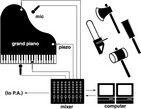Review: Houston Symphony
Like in the old joke, Jean-Yves Thibaudet and the Houston Symphony played Tchaikovsky Saturday night. Tchaikovsky lost in a battle of conductor vs. soloist reminiscent of the Bernstein/Glenn Gould Brahms 1st Concerto that prompted Lenny to give a pre-performance disclaimer to the audience.
 Trying the unsentimentalized, bat out of hell approach to that old warhorse, the First Piano Concerto, the performance started out refreshingly bracing. Unfortunately, the lyrical phrases that could have used some Romantic rubato were also taken at breakneck pace. It didn’t take long for Hans Graf’s discomfort with the situation to become apparent, either. He frequently had to push the orchestra to keep up with Thibaudet*, and more than one orchestral passage took a more sedate tempo that was immediately canceled out with the reentry of the soloist.
Trying the unsentimentalized, bat out of hell approach to that old warhorse, the First Piano Concerto, the performance started out refreshingly bracing. Unfortunately, the lyrical phrases that could have used some Romantic rubato were also taken at breakneck pace. It didn’t take long for Hans Graf’s discomfort with the situation to become apparent, either. He frequently had to push the orchestra to keep up with Thibaudet*, and more than one orchestral passage took a more sedate tempo that was immediately canceled out with the reentry of the soloist.By the third movement, the tug of war had turned into comedy (this is Tchaik 1 – there’s no need to invoke “travesty” on such an oft-maligned composition). I laughed out loud more than once and exchanged several bemused glances with EKB (the better half). She’s now comparing the performance to Yosemite Sam cartoons. I’m wondering how much of this caricature was Jean-Yves being petulant after disagreeing with Graf in rehearsals. (A backstage report informed us that the musicians were highly agitated over unresolved issues before curtain.)
The fight with the orchestra over interpretation wasn’t the only battle to watch. Thibaudet was also struggling with the instrument he had on stage. The piano (apparently a replacement since the flooding from Tropical Storm Allison ravaged the Symphony’s offices in 2001) did not project well in its upper registers, and when it did sound with any volume, the tone was thin. Thibaudet’s execution also had some sloppy stretches at such high speed, though I got the impression this was more a function of attitude than of any strain on his formidable technique.
The audience lapped the performance up, of course. I’m conflicted about this. On the one hand, it’s great to see people strong attendance and enthusiasm at the symphony. And who am I to say “Wise up, folks. That was the most tasteless Tchaikovsky Concerto I’ve ever heard!” But on the other, how can I not? This was like a sci-fi B-movie; so bad it was funny. Thibaudet sure as hell didn’t deserve the extended ovation that followed.
 Opening the program, the performance of Jennifer Higdon’s blue cathedral was handicapped by the tension thrumming through the orchestra. After intermission, the Symphony rallied with The Firebird – a little too long in its complete form, but it was nice to settle down after the preceding madness. Original costume designs were projected as a welcome visual accompaniment. (The picture here is not one of them. It’s a storybook illustration by Ivan Bilibin.)
Opening the program, the performance of Jennifer Higdon’s blue cathedral was handicapped by the tension thrumming through the orchestra. After intermission, the Symphony rallied with The Firebird – a little too long in its complete form, but it was nice to settle down after the preceding madness. Original costume designs were projected as a welcome visual accompaniment. (The picture here is not one of them. It’s a storybook illustration by Ivan Bilibin.)See also: Houston Chronicle
* The picture at right should have a caption along the lines of 'Jean-Yves should be locked away after Saturday's concert,' but I quit fighting with HTML after awhile.





